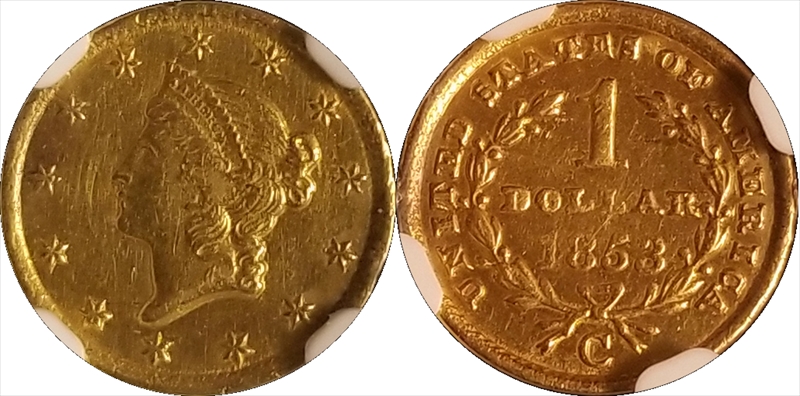1853-C G$1 PCGS号7522
专家评论
David Akers (1975/88)
Comparable in overall rarity to the 1852-C, but much less available in high grade, that is, AU or Unc. Like most C Mint gold dollars, the planchets are often very poor and the dies used also show numerous defects.Doug Winter
The 1853-C is the final Type One gold dollar struck in Charlotte. It is similar in rarity to the 1852-C despite having an original mintage that is nearly 25% greater.The 1853-C gold dollar is relatively available in Very Fine and Extremely Fine grades. It is scarce in About Uncirculated and most of the examples in this grade range are low-end. It becomes very scarce in the higher AU grades and is rare in Uncirculated. Nearly every Uncirculated 1853-C grades MS60 to MS62. Properly graded MS63 to MS64 examples are extremely rare and I have seen only three or four that I feel qualify as such. There is a single gem known.
STRIKE: This is the worst struck Type One gold Dollar from the Charlotte Mint. The obverse is better detailed than the reverse. The center is fairly sharp with the exception of the curls around the face. The border shows decent detail although a number of the stars are weak at the centers and do not have full radial lines. The reverse is always weakly struck, especially at the center. The letters in DOLLARS show varying degrees of weakness. On many coins, at least one if not both of the Ls are weak while the O may also be faint. The date is usually weak and I have not seen very many that had a fully legible 18. The wreath is the sharpest struck area on the reverse with the exception of the lowest pair of leaves which may be weak. The top of the bow is often weak as well.
SURFACES: Many 1853-C gold dollars were struck on defective planchets. They often show chips in the field as well as splits and fissures. It is possible to locate an example that was produced on a decent quality planchet but such pieces are quite rare.
LUSTER: Along with the 1850-C, this issue tends to have the worst quality luster of any Type One gold dollar from this mint. It is typically dull and grainy with an unappealing appearance. I have seen a number of semi-prooflike examples but many of these have poor eye appeal due to extensive surface abrasions.
COLORATION: The natural coloration is a distinctive medium to deep greenish-gold hue. It is extremely hard to locate an 1853-C gold dollar with original color as nearly every known piece has been cleaned or dipped at one time.
EYE APPEAL: This is an issue that is seldom found with good eye appeal. Most are not well struck at the central reverse and this weakness is compounded by detracting mint-made planchet defects. Coins that are well struck and original with good quality planchets should trade for considerable premium above typical quality examples.
DIE CHARACTERISTICS: No prominent characteristics are seen on 1853-C Gold dollars.
DIE VARIETIES: There are two die varieties known.
Variety 1 (formerly Variety 8-1): The date is heavy and it slants downwards slightly. The letters are recut. On some specimens they are heavily recut while on others the recutting is lighter but still noticeable. The mintmark is not doubled.
Variety 2 (formerly Variety 8-J): The date is lighter and it is placed more level. The letters are doubled. The mintmark is noticeably doubled punched, making this variety easy to detect.
This is the rarer of the two varieties.
PCGS #
7522
设计师
James Barton Longacre
边缘
Reeded
直径
12.70 毫米
重量
1.70 克
铸币数量
11515
金属成分
90% Gold, 10% Copper
更高评级数量
0
评级较低的钱币数量
0
地区
The United States of America
价格指南
PCGS 数量报告
拍卖 - PCGS 评级的
拍卖 - NGC 评级的
稀有性和存量估计 了解更多
| 所有评级 | 150 |
| 60或以上 | 15 |
| 65或以上 | 0 |
| 所有评级 | R-7.5 |
| 60或以上 | R-9.3 |
| 65或以上 | R-10.1 |
| 所有评级 | 7 / 26 TIE |
| 60或以上 | 7 / 26 TIE |
| 65或以上 | 1 / 26 |
| 所有评级 | 20 / 81 TIE |
| 60或以上 | 17 / 81 TIE |
| 65或以上 | 1 / 81 |
























